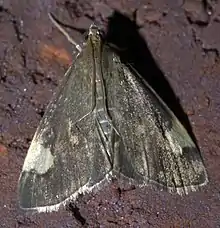| Evergestis unimacula | |
|---|---|
 | |
| Scientific classification | |
| Domain: | Eukaryota |
| Kingdom: | Animalia |
| Phylum: | Arthropoda |
| Class: | Insecta |
| Order: | Lepidoptera |
| Family: | Crambidae |
| Genus: | Evergestis |
| Species: | E. unimacula |
| Binomial name | |
| Evergestis unimacula | |
| Synonyms | |
| |
Evergestis unimacula, the large-spotted evergestis moth, is a moth in the family Crambidae. It was described by Augustus Radcliffe Grote and Coleman Townsend Robinson in 1867.[1] It is found in North America, where it has been recorded from Georgia, Illinois, Indiana, Iowa, Maryland, Michigan, North Carolina, Ohio, Oklahoma, Ontario, Pennsylvania, Quebec, Tennessee and West Virginia.[2] Outliers have been recorded from Florida.
Etymology
The species name is derived from Latin unimacula (meaning one spot).[3]
References
- ↑ Nuss, M.; et al. (2003–2017). "GlobIZ search". Global Information System on Pyraloidea. Retrieved June 28, 2018.
- ↑ "801075.00 – 4901 – Evergestis unimacula – Large-spotted Evergestis Moth – (Grote & Robinson, 1867)". North American Moth Photographers Group. Mississippi State University. Retrieved June 28, 2018.
- ↑ McLeod, Robin (August 3, 2014). "Species Evergestis unimacula - Large-spotted Evergestis - Hodges#4901". BugGuide. Retrieved June 28, 2018.
This article is issued from Wikipedia. The text is licensed under Creative Commons - Attribution - Sharealike. Additional terms may apply for the media files.